'Not Fade Away': 5 Years After 'Sopranos,' Does David Chase Still Hate People?
‘Not Fade Away’: 5 Years After ‘Sopranos,’ Does David Chase Still Hate People?
by Amy Monaghan and Sean Burns
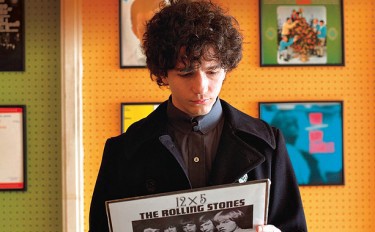
Amy Monaghan: Talk to me about how, as a “Sopranos” fan, you felt about the news of a David Chase movie at long last, the coming-of-age-in-Jersey film Not Fade Away, which we are here to dismantle today.
Sean Burns: Mostly I wondered what took him five years. I knew Chase had taken off to France for a while, presumably hiding from the folks with torches and pitchforks after that “Sopranos” finale. But he has such a distinctive cinematic sensibility, I thought he’d be making movies a lot sooner.
Amy: His distinctive cinematic sensibility? Remember, I’m the only person on the planet to never watch “The Sopranos.” No, wait, I did see one episode. Annabella Sciorra was Tony’s mistress and met a bad end, I think?
Sean: Yeah, have I nagged you about that lately?
Amy: Fuhgettaboutit. Listen, right after I read Ulysses and Infinite Jest, I am ON IT.
Sean: What I think confounded people about “The Sopranos” was that Chase viewed the gangsters and goombahs milieu through the prism of 1960s European art cinema. The edits were elliptical, storylines abruptly abandoned, and he was never afraid to dive into surrealism. The show’s sometimes terrifyingly evocative (and other times hilarious) dream sequences were a constant thorn in the side of viewers who just wanted to watch people get whacked.
Amy: As one does. OK, so he’s not afraid of ambiguity and pissing people off. In fact, when we first talked about Not Fade Away, you told me “I think Chase just hates people.”
Sean: Well, “The Sopranos” is my favorite show ever because I feel like it captures a cultural moment, a nagging existential dissatisfaction in the midst of lavish material excess. So much of the show is about consumption and waste. There’s more eating and shitting on this show than we ever saw on television.
Amy: You can’t have Italian Americans without eating.
Sean: And the arc of the series, particularly the final season, saw every one of the rotten, soul-sick characters given a second chance to change their lives and (possibly) redeem themselves. But after a bit of lip service they all went right back to what was most convenient. Which in the case of this show meant either crime or, best-case scenario, severe moral compromise. So yeah, I don’t think Chase has a particularly sunny view of humanity.
Amy: Let’s artfully segue from dissatisfaction to how Not Fade Away begins. A televised emergency broadcast system siren bleeds into the Rolling Stones’ “(I Can’t Get No) Satisfaction” on the soundtrack. How would you rate your anticipation/giddiness at that opening moment, having waited for five years?
Sean: It might be my favorite metatextual gag since David Lynch smashed a TV in the opening shot of the Twin Peaks movie.
Amy: Yeah, but “Satisfaction,” of all songs? (Eyeroll) I mean, aside from advertising from note one that this movie had an ENORMOUS music clearance budget, why go for the Time-Life greatest hit of hits? (Caveat: I may still nurse a grudge about Chase disinterring that fucking Journey song from where I’d happily left it, at high school dances.)
Sean: If you’re going to play around with iconography, might as well aim high.
It’s a strange film, and I don’t think it entirely works, but I can see what he was attempting.
Amy: Which is?
Sean: This is a very familiar story, so familiar that he skips across the predictable beats in an elliptical fashion, focusing mostly on odd details. It feels very much like a personal remembrance using a hackneyed formula as a mere clothesline.
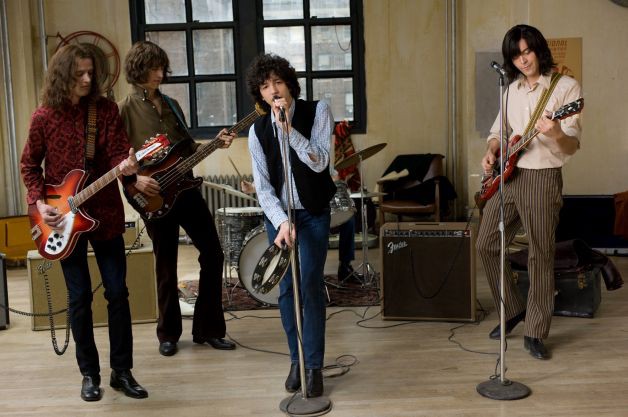
Amy: Gotcha. So, familiar story: Douglas (John Magaro) and his friends Eugene (Jack Huston) and Wells (Will Brill) start a band in 1960s New Jersey. They practice. They work shitty jobs and/or go off to college. They play a house party. They pine after Grace (Bella Heathcote with bangs that walked right off the sleeve of The Freewheelin’ Bob Dylan, perhaps prompting Douglas to later sport a Bobby Z. perm?). There are rivalries, family strife, Vietnam obliquely, college, weed, dropping out, ventures into Manhattan, and almost but not quite “making it.”
Sean: I gather that you hated it.
Amy: No, I didn’t hate it. I was impatient with it. Of COURSE there’s the beautiful girl the shy drummer longs for who only looks his way once he starts singing lead. Maybe I also agreed with the father, Pat (James Gandolfini), that Douglas could be a whiny little prick. Tell me about the family dynamic in Not Fade Away vis-a-vis your beloved “Sopranos” template. There’s the “Chase and Gandolfini, together again” aspect, of course. But what the fuck does Chase have against mothers?
Sean: His mother issues are a topic not even years of therapy and a long-running television program could even begin to unpack, obviously. But yes, I agree with you that the kid could indeed be a whiny little prick — which is something you never see in semi-autobiographical memory flicks like this. Filmmakers are usually trying so hard to idealize their childhood selves, but in this case Douglas is terribly short-sighted and can be more than a little bit of an asshole.
Amy: That whole scene when he comes back for the holidays and pitches a fit at the dinner table, all “The BAND’S my family now.” Oof.
Sean: The kids in this movie are a lot like Meadow and A.J. on “The Sopranos,” so self-obsessed they’re often oblivious to anything outside their tiny universe.
Amy: Even Vietnam. Or the civil rights movement.
Sean: Exactly. The Kennedy assassination barely even registers with the kids in this movie.
Amy: Well, the movie starts just after. But yeah, I feel like Chase drops in these shriekingly obvious “here’s what’s happening in the world” markers, usually via the television, so we have a sense of what time it is outside of their bubble. Like the girls watching the Stones perform on television in a room smeary with cigarette smoke or Douglas heading to Los Angeles of COURSE right as RFK’s ready to make his speech/get assassinated.
Amy: Oh, hey, can we talk about Grace’s sister? The “Jenny” a la Forrest Gump embodiment of THE COUNTERCULTURE???
Sean: Not my favorite subplot. Her scenes are played a lot broader than the rest of the picture.
Amy: She LIVES IN THE VILLAGE. She DOES DRUGS. She PAINTS FUCKED-UP PICTURES. Why have her in the movie? Is she meant to suggest that even beautiful, rich Grace has depth and problems? How does she fit into your larger understanding of the Chase-i-verse?
Sean: Well, I originally thought she was so overscaled to suggest the exoticism of older sisters in the world of teenage boys.
Amy: Ah, that I would actually buy. Along with suggesting that even a rich, country club family and not just Pat the Pep Boy employee’s goombah brood is confounded by the changing culture?
Sean: Yeah, and it is classic Chase that her flower-power slogans are often risible. He’s remembering a time while being a bit too clear eyed to idealize anything. Well, anything except the music.
Amy: Yes, the music. When I saw Not Fade Away at the New York Film Festival, Little Steven, resplendent in purple from pirate headscarf to suede booties, was part of the post-screening press conference. He and Chase talked about how rock n’ roll comes out of places like suburban Jersey because there are cars and garages there. What did you think of the practice/performance scenes?
Sean: I assume Little Steven coached them to death, because I was convinced. What I enjoyed about that aspect of the movie is the dearly now out-of-fashion idea of rock ’n’ roll as an agent of liberation and escape.
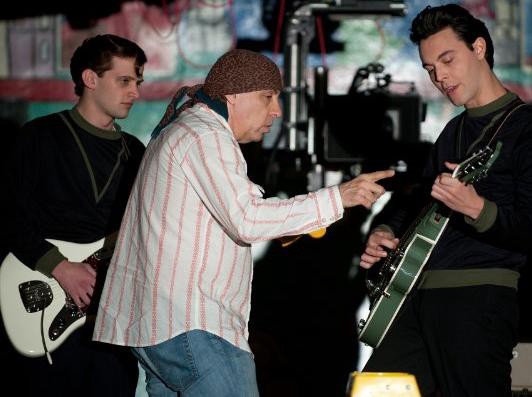
Amy: Little Steven said he ran a boot camp, after Chase ignored his plea to cast musicians who could act. And I agree, there’s something urgent and vital about a Bo Diddley drum beat that can’t be denied.
Sean: At that age, when you are just forming your identity, isn’t it natural to define yourself at least in part by what kind of music you listen to?
Amy: Oh, DEFINITELY. This is my tribe, my people. Beatles or Stones? These are life-and death-fealties, for sure. And, I guess, Not Fade Away being essentially a Stones picture would explain the more bluesy longueurs of the pacing overall? Because you’d think 4/4 rock might otherwise impose a more uniform rhythm.
Amy: What about when the band plays the house party the first time they and their classmates are back home from college for the holidays? Douglas steps in after lead singer Eugene swallows a joint and sings “Time Is On My Side” while following Grace’s movement through the party.
Sean: That’s a lovely scene.
Amy: Indeed. And then there’s Lee Hazlewood’s “Some Velvet Morning” later on, not played by the band but underpinning a motorcycle accident. (And I just gotta say, after Dylan, of COURSE there’s a motorcycle accident.)
Sean: A remarkably low-stakes motorcycle accident involving a garden gnome.
Amy: Ahem, shouldn’t you say “spoiler alert” or something? But going back to that party, I loved how quickly Douglas’s post-performance high crashes when Grace says she’s dating an adjunct professor of medieval Persian poetry. I mean, of course she is. That’s what unattainable girls like that do after they graduate from dating high-school jocks.
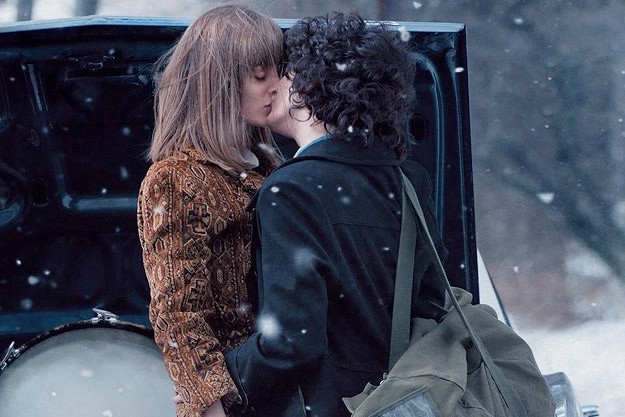
Sean: I think the hugeness of the music is at times a very funny contrast with the smallness of these characters and their limited world.
Amy: Yes, that “hugeness.” I think the aggressiveness with which this era’s music has been telling us how to feel for 50 years now might have something to do with that impatience I felt. Also, during the press conference, Boomers in the crowd asked questions that congratulated themselves on their musical taste and breathlessly asked the 80s-born actors, how could you possibly channel the AWESOMENESS of this era you missed but have had shoved down your throat as the sine qua non of AWESOMENESS ever since.
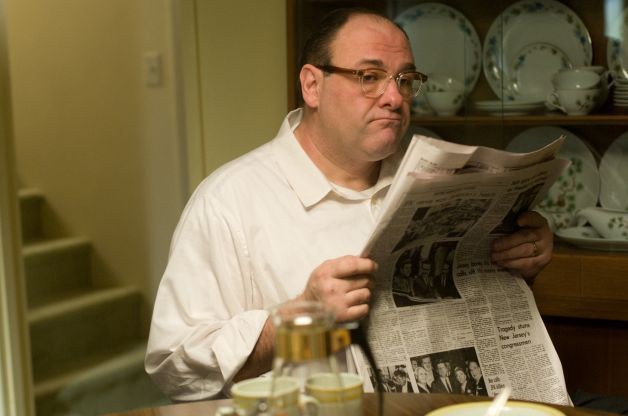
Sean: There’s nothing that makes my teeth itch worse than Boomer nostalgia. But it’s not like we’re talking about Across the Universe here or a Robert Zemeckis film. Look at James Gandolfini, who is actually wrestling with far more serious crises and even life-and-death concerns that his son barely notices.
Amy: True. Douglas essentially shits on his father Pat’s dream of upward mobility for his kids by dropping out of college, and they remain at an impasse until that scene in the restaurant. I understood then why you-all revered Tony Soprano so.
Sean: Gandolfini’s on a remarkable run right now, stealing scenes in Zero Dark Thirty and walking away with Killing Them Softly. What I enjoyed was how much more layered Pat was than the usual “disapproving father” cliché, despite dropping racist and homophobic slurs during the family cookout.
Amy: Do you think having Pat’s big moment of treating his son like the man of the family — at a restaurant — gives “Sopranos” fans a little gift since they left Gandolfini in that diner so abruptly five years ago?
Sean: I love that diner scene so much (yes, even the Journey song) that I want Tony to stay in limbo there forever. But what I think the restaurant scene here does — by far the best scene in the movie — is capture that moment growing up when you discover that your father actually once had his own life beyond just caring for your family, which always feels like such a shock even though it obviously shouldn’t.
Amy: Oh, I agree. And it is so much more compassionate about the generational divide than anything else the movie gives us. Here is a man with regrets and never-disclosed passions who follows the code of responsibility to his family even as he admires Douglas’s relative freedom to follow Grace and his dreams out to California. And the grace-note shot of him watching “Bali Ha’i” from South Pacific on television while his shrewish wife sleeps on the sofa beside him… chills.
Amy: I suspect that set of scenes also brings us back to what you said earlier about Chase and 60s art films. Douglas complains when he’s watching Blow-Up with Grace (because what young man hasn’t endured an art movie to impress a girl?): “Nothing happens and there’s no orchestra to tell you to watch out, this guy’s gonna get killed.”
Sean: That’s a bingo. And after five years people are still trying to “prove” whether or not Tony Soprano died in that diner, as if a work of art is a puzzle that can be solved.
Amy: Listen to you, sounding like something out of the nouvelle vague! I loved Grace’s answer, too: “I think the trees are the music.” Which brings me to the movie’s final set piece, when Douglas goes to California with the (David Chase-ian) idea of “putting music together with film images.” There’s some of that leaden stuff that irks me for being too telegraphed: a marquee advertising The Graduate and shots of the Capitol Records building as ubiquitous as the Eiffel Tower in a Paris-set picture. But then there’s that ENDING. What in the hell do you think viewers are gonna do with that?
Sean: I have a sneaking, completely un-provable suspicion that Little Steven wrote that closing line, because it sounds exactly like stuff he says on his radio show all that time. That said, I thought it was unfortunate but salvaged by the closing credits in which the Sex Pistols play behind a vintage “American Bandstand” clip, and the music and movements are weirdly in sync — suggesting a continuity through the generations. But before that… um, yeesh.
Amy: Yeesh “the younger sister dancing” or yeesh “Roadrunner”?
Sean: The younger sister.
Amy: Oh, good, because “Roadrunner” redeemed it for me, although obviously not completely. It was not just beautifully leftfield. (Although when Chase was asked why he closed with a song that chronologically anachronistic, he said, “I like that song.”) What I really loved about the choice is that “Roadrunner” launches into orbit with Jonathan Richman’s exhilarating count-off, which I think Greil Marcus writes about as a crucial turning point for popular music: “One-two-three-four-FIVE.”
Sean: Oh, that wasn’t the Sex Pistols version?
Amy: Shit, I think it might be. But even so, I felt as though I could breathe again. So, is this the sort of movie people should see with their Boomer parents on Christmas?
Sean: They’ll probably want to see that fucking thing with Billy Crystal and Bette Midler, instead.
Amy: Or Streisand and Rogen. But, I guess, if you must see only one movie where non-musicians sing… give me Little Steven over sub-par Susan Boyle.
Under her own name and as the Cinetrix, Amy Monaghan has been writing on the Internets since 2003. A senior lecturer in film studies and literature, she probably should be grading papers right now.
Sean Burns writes for Philadelphia Weekly and The Improper Bostonian. He catches it all at Spliced Personality.
